Continuing Education – Distilled, Practical & Advanced Knowledge

CALGreen Embodied Carbon Series (Qualifies for ZNCD portion of CA License Renewal)
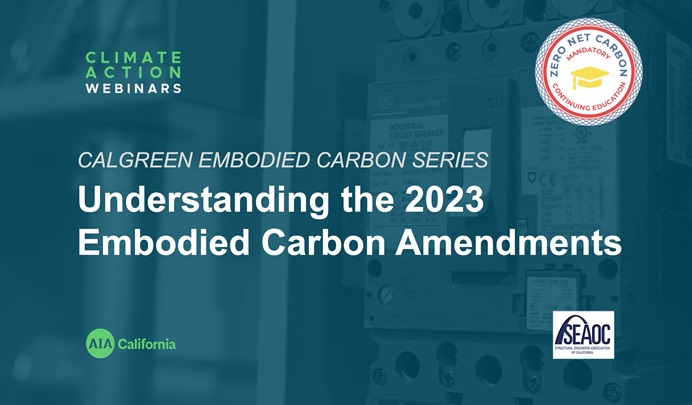
CALGreen Embodied Carbon Series: Understanding the 2023 Embodied Carbon Amendments
AIA/CES (HSW), 1.25 LUs

CALGreen Embodied Carbon Series: Whole Building Life Cycle Assessment for Code Compliance
AIA/CES (HSW), 1.25 LUs
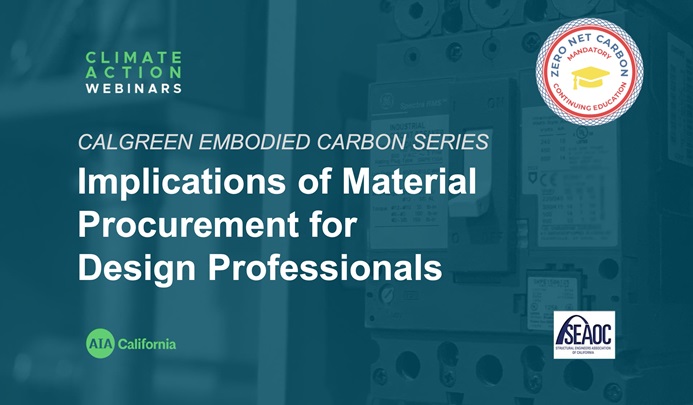
CALGreen Embodied Carbon Series: Implications of Material Procurement for Design Professionals
AIA/CES (HSW), 1.25 LUs
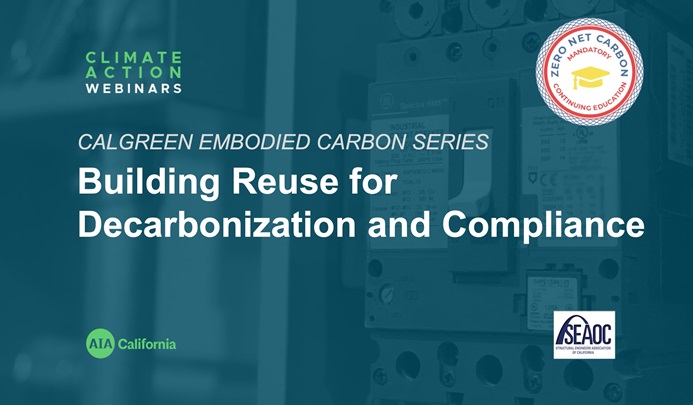
CALGreen Embodied Carbon Series: Building Reuse for Decarbonization and Compliance
AIA/CES (HSW), 1.25 LUs

ZNCD: Overview Courses (Qualifies for ZNCD portion of CA License Renewal)
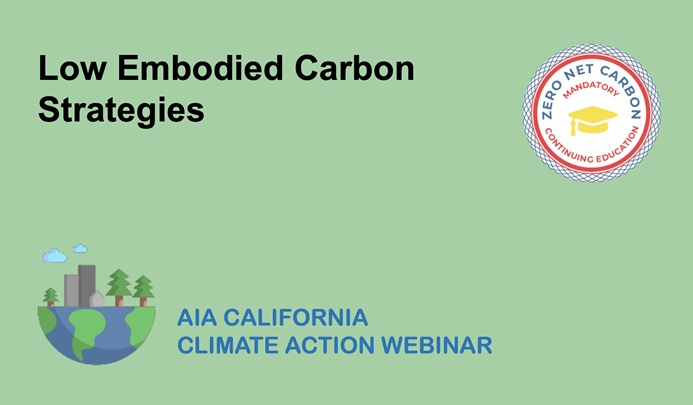
Low Embodied Concrete Strategies
AIA/CES (HSW), 1.75 LUs
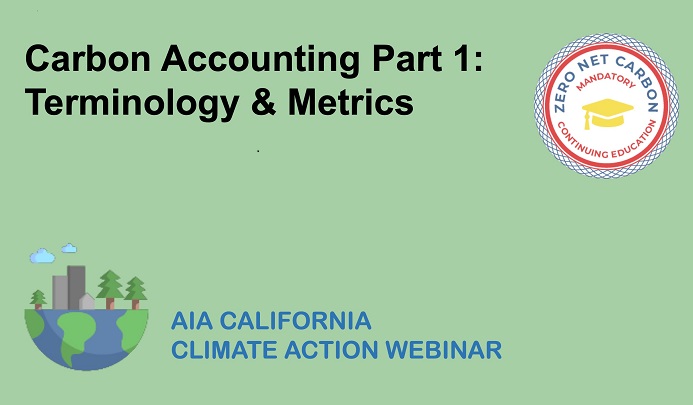
Carbon Accounting Part 1: Terminology and Metrics
AIA/CES (HSW), 1.25 LUs
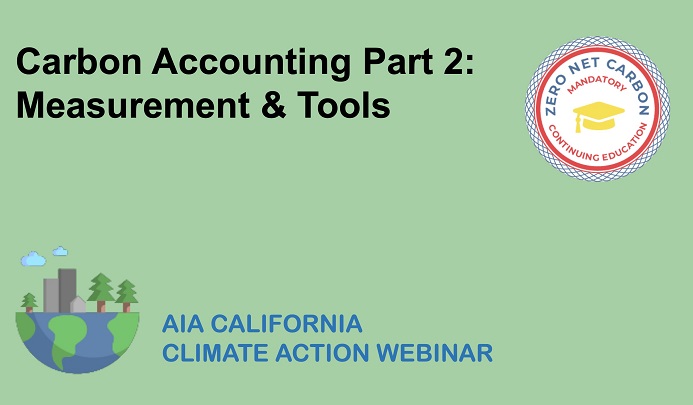
Carbon Accounting Part 2: Measurements and Tools
AIA/CES (HSW), 1.25 LUs
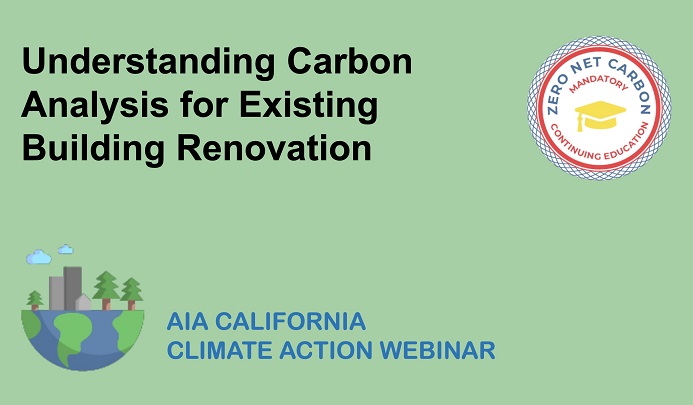
Understanding Carbon Analysis for Existing Building Renovation
AIA/CES (HSW), 1.25 LUs
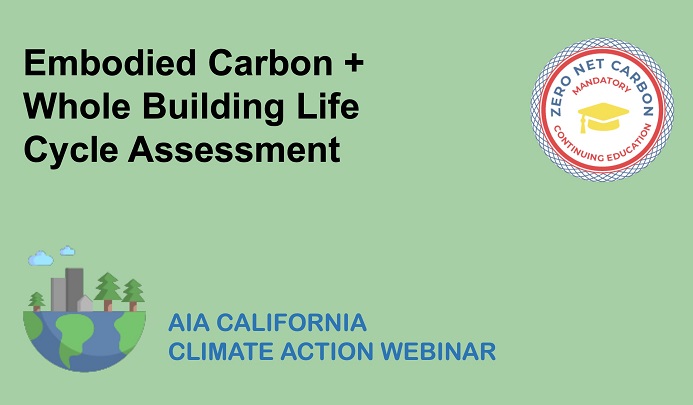
Material Selection: Embodied Carbon + Whole Building Life Cycle Assessment
AIA/CES (HSW), 2 LUs
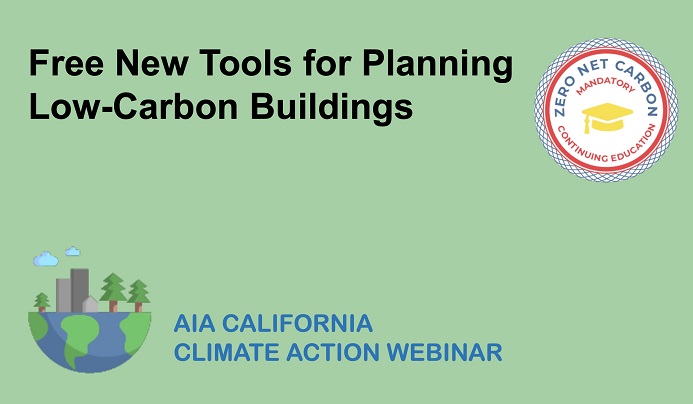
Free New Tools for Planning Low-Carbon Buildings
AIA/CES (HSW), 2 LUs
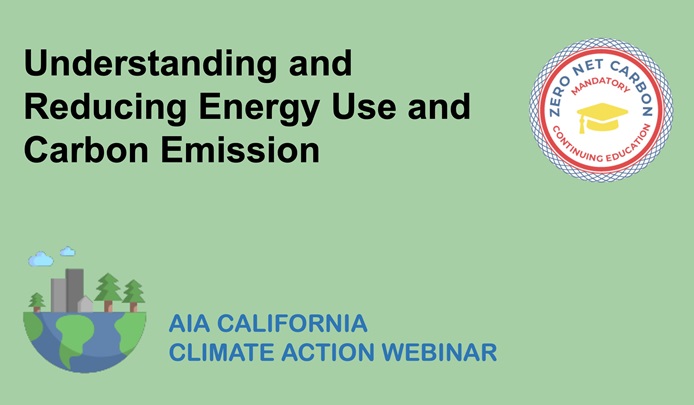
Understanding and Reducing Energy Use and Carbon Emissions in Museums
AIA/CES (HSW), 1.75 LUs


ZNCD: Case Studies (Qualifies for ZNCD portion of CA License Renewal)
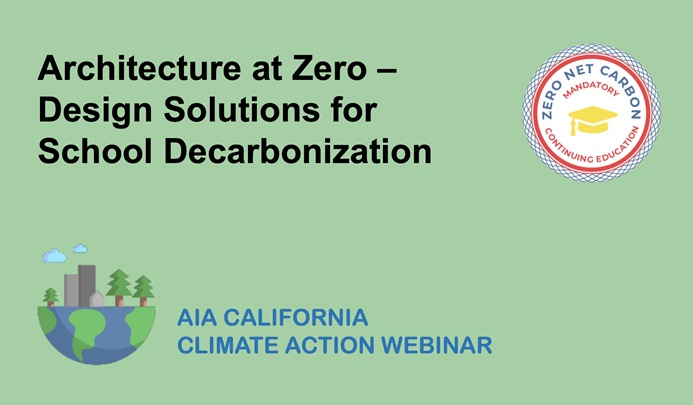
Architecture at Zero – Design Solutions for School Decarbonization
AIA/CES (HSW), 1.25 LUs
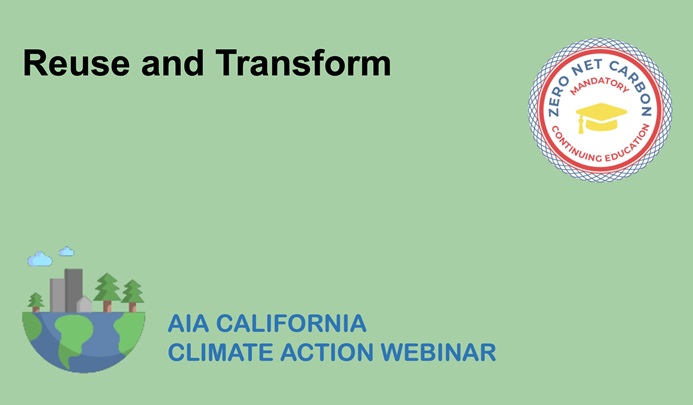
Reuse and Transform
AIA/CES (HSW), 1.75 LUs
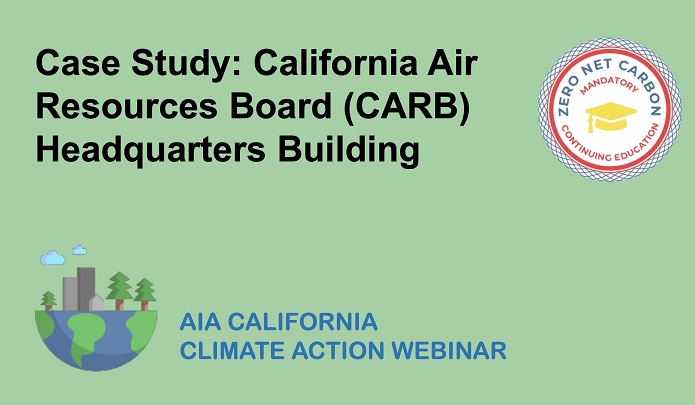
Case Study: California Air Resources Board Headquarters Building
AIA/CES (HSW), 1.5 LUs
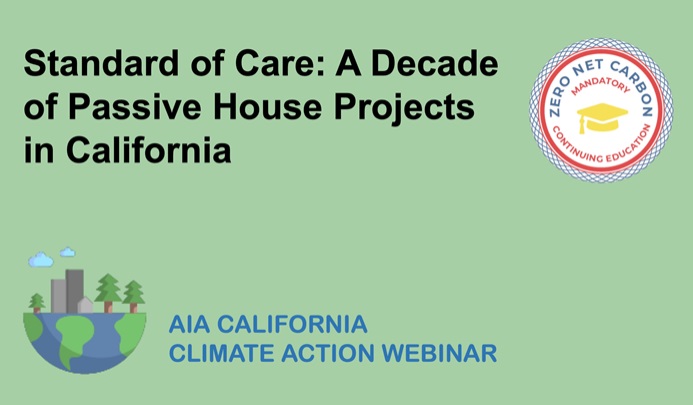
Standard of Care: A Decade of Passive House Projects in California
AIA/CES (HSW), 1.25 LUs

ZNCD: Design Culture & Excellence (Qualifies for ZNCD portion of CA License Renewal)
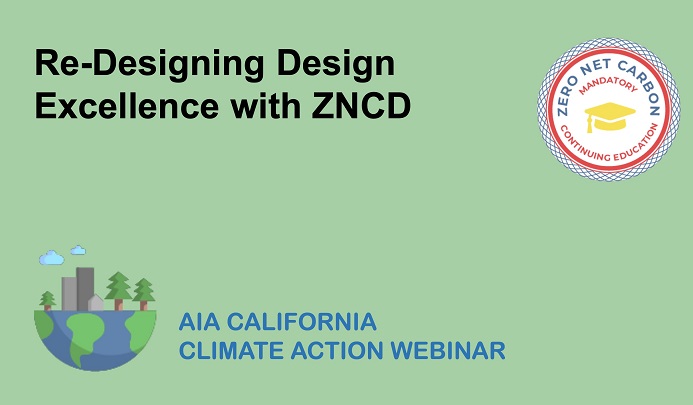
Re-Designing Design Excellence
AIA/CES (HSW), 1.25 LUs
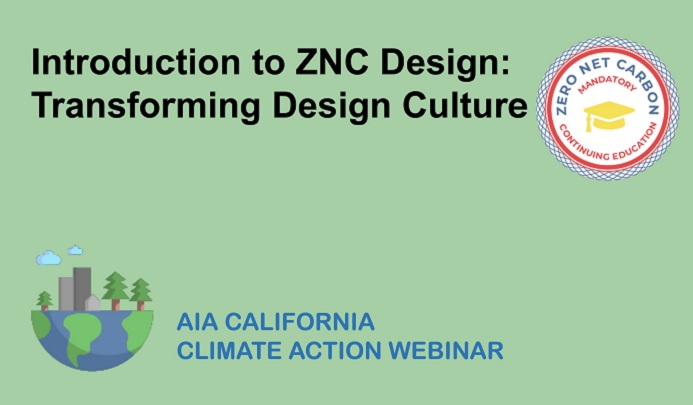
Introduction to Zero Net Carbon Design: Transforming Design Culture
AIA/CES (HSW), 1.25 LUs
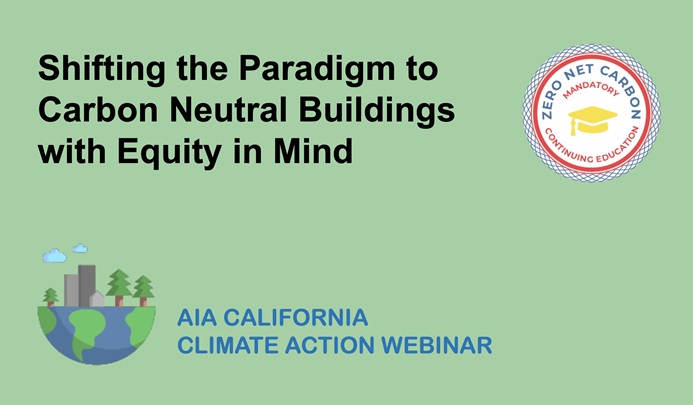
Shifting the Paradigm to Carbon Neutral Buildings with Equity in Mind
AIA/CES (HSW), 1.75 LUs
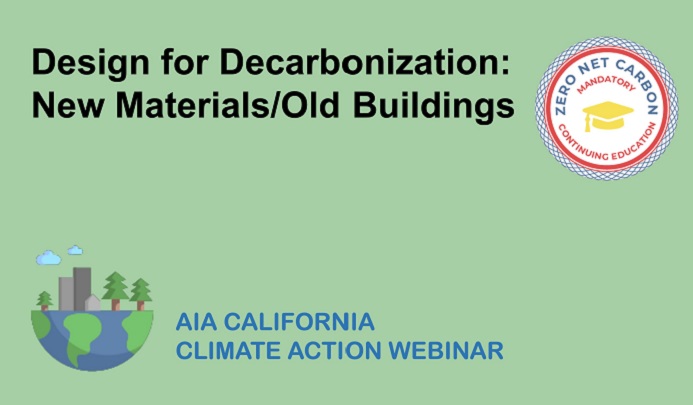
Design for Decarbonization: New Materials / Old Buildings
AIA/CES (HSW), 1.25 LUs

ZNCD: All-Electric Solutions (Qualifies for ZNCD portion of CA License Renewal)
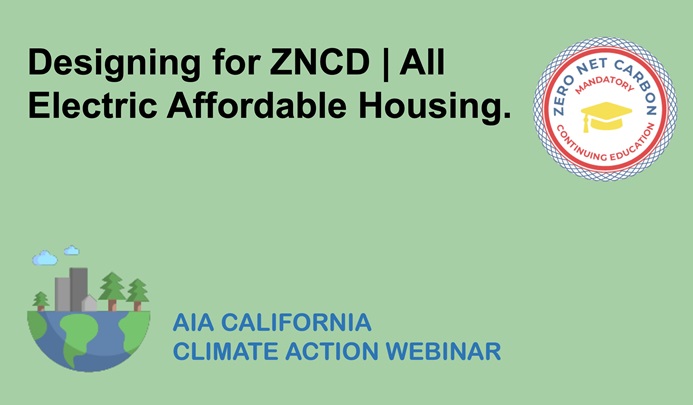
Designing for ZNCD | Case Studies of All-Electric Affordable Housing Projects
AIA/CES (HSW), 1.75 LUs
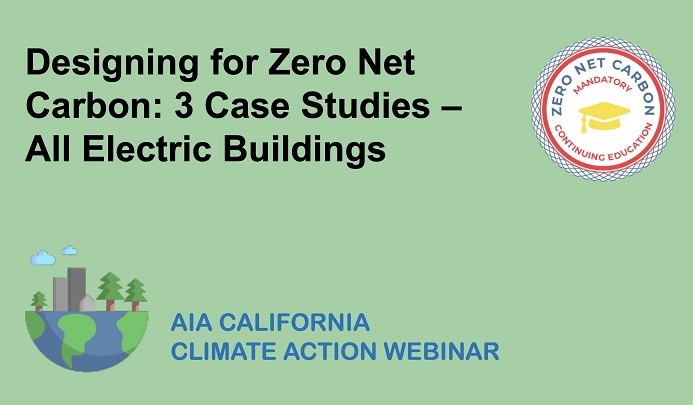
Designing for Zero Carbon - Three Case Studies of All-Electric Buildings
AIA/CES (HSW), 1.75 LUs
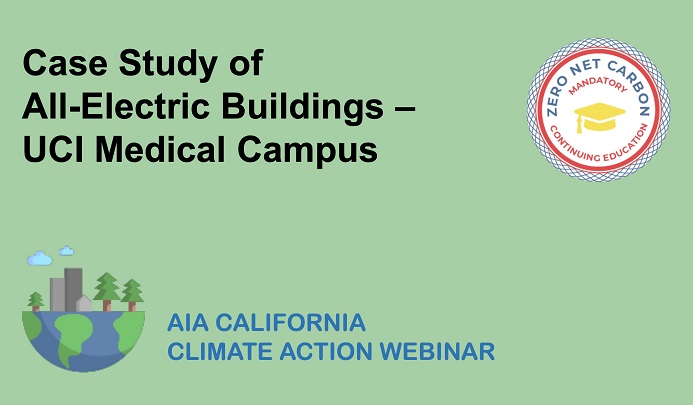
All-Electric Buildings – UCI Medical Campus
AIA/CES (HSW), 1.75 LUs
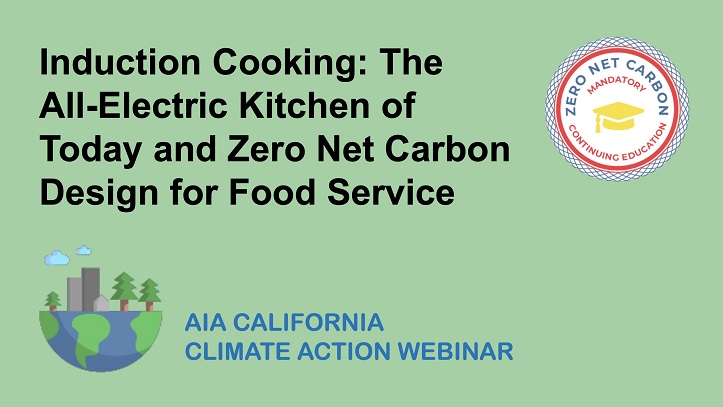
Induction Cooking: The All-Electric Kitchen of Today and ZNCD for Food Service
AIA/CES (HSW), 1.25 LUs
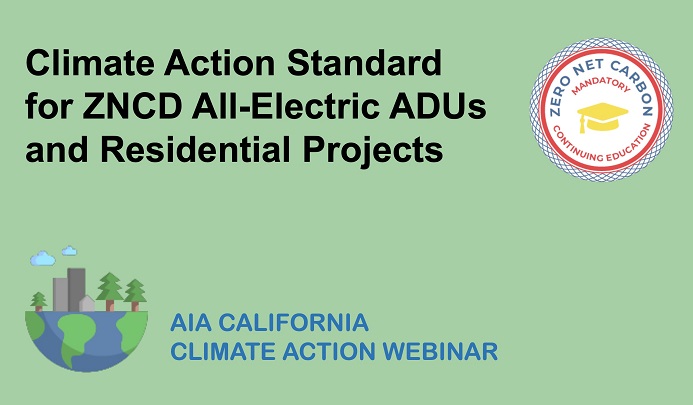
Climate Action Standard for ZNCD All-Electric ADUs and Residential Projects
AIA/CES (HSW), 1.75 LUs
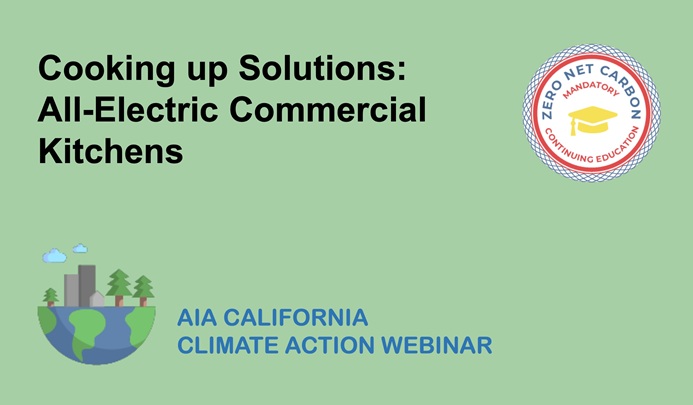
Cooking up Solutions: All-Electric Commercial Kitchens
AIA/CES (HSW), 1.75 LUs


ZNCD: Resiliency (Qualifies for ZNCD portion of CA License Renewal)
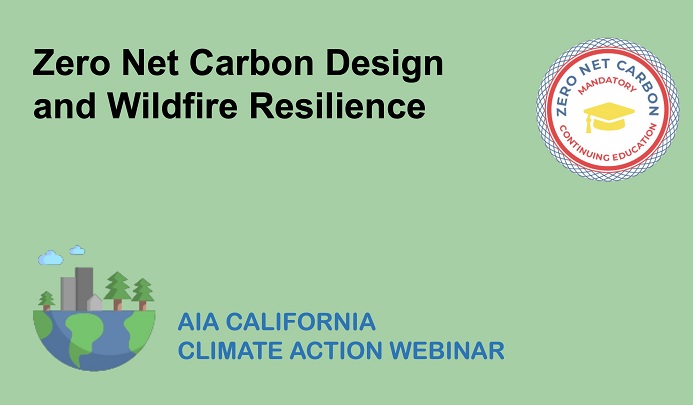
Zero Net Carbon Design and Wildfire Resilience
AIA/CES (HSW), 1.25 LUs
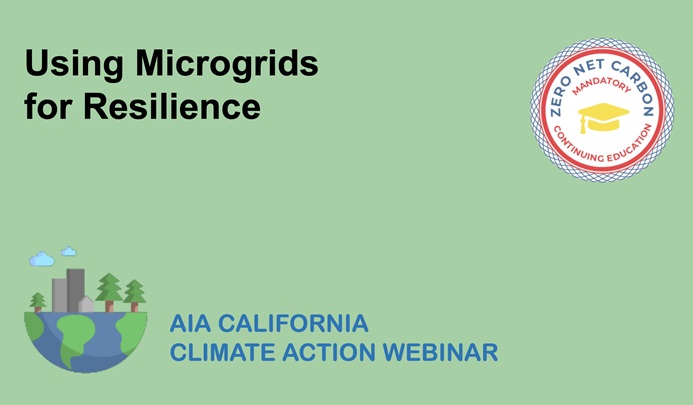
Using Microgrids for Resilience
AIA/CES (HSW), 1.75 LUs

ZNCD: Residential Design (Qualifies for ZNCD portion of CA License Renewal)
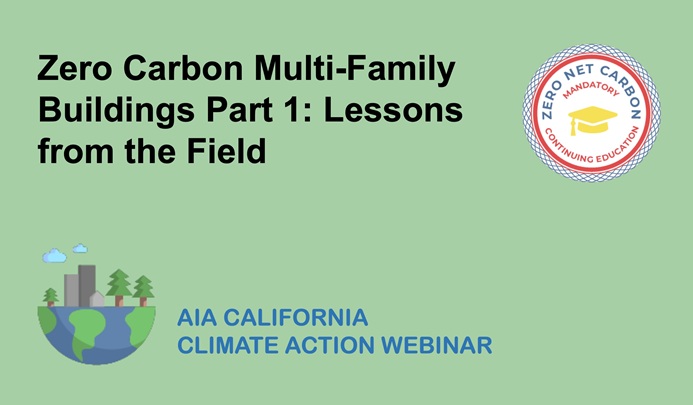
Zero Carbon Multi-Family Buildings Part 1: Lessons from the Field
AIA/CES (HSW), 1.75 LUs
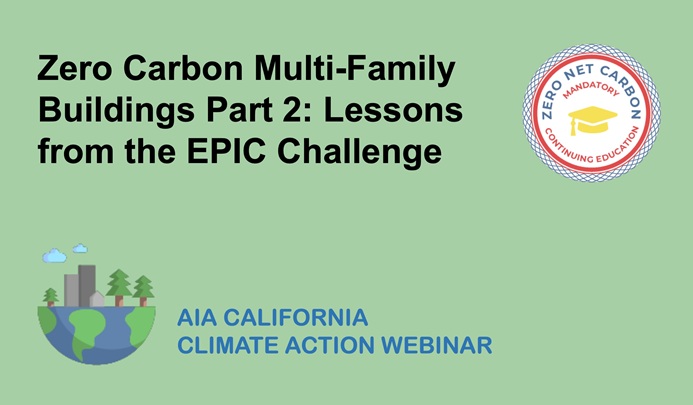
Zero Carbon Multi-Family Buildings Part 2: Lessons from the EPIC Challenge
AIA/CES (HSW), 2.0 LUs

Climate Action
Related AIA California - Climate Action and ZNCD Resources
DISCOUNTED Course Bundles
- Course Bundle Overview
- Accessibility 2025 (AIA California)
- MDC 2024 Keynotes (AIA California)
- AIA Seattle 2024 Housing Forum
- AIA Los Angeles & AIA|LA COTE 2024 1.5 Degrees Symposium
- AIA California CALGreen Embodied Carbon
- Accessibility 2023 (AIA California)
- AIA Seattle 2023 Housing Summit
- AIA Seattle 2024 Climate Summit
- AIA Seattle 2023 Climate Summit
- AIA Seattle 2022 Housing Forum - Transforming Residential Practice
- AIA Seattle 2019 Housing Forum - Density Done Right
- AIA Seattle 2018 Housing Forum - Housing Innovations
- MDC 2022 Keynotes (AIA California)
- MDC 2019 Keynotes (AIA California)
- MDC 2017 Keynotes (AIA California)
- MDC 2017 Emerging Talent (AIA California)
- MDC 2015 Keynotes (AIA California)
- MDC 2013 Keynotes (AIA California)
- MDC 2011 Keynotes (AIA California)
- Accessibility 2017 (AIA California)
- Accessibility 2019 (AIA California)
- Accessibility 2021 (AIA California)
- AIA Seattle 2022 Equity & Advocacy in Rapid Decarbonization
- AIA Seattle 2021 Just Transitions - Upstream and Downstream Impacts of Decarbonization
- AIA Los Angeles & AIA|LA COTE 2020 Two Degrees Symposium
- Active Design (AIA New York)
- Sustainable Design (USGBC-NCC)
- Sustainability Practices (AIA New York, AIACC)
- Financial Management for Design Professionals
- Leadership Effectiveness (AIA Dallas)
- Practice Mgmt. (for small and mid-size firms)
- Project Delivery Methods (AIA California)
- Specifications & CA Phase Best Practices
- Risk Management
- Growing a Small Firm (AIA San Francisco)
DISCOUNTED Group Pricing
Course Providers
- All providers
- aecKnowledge
- AIA California - Accessibility
- AIA California - Climate Action and ZNCD
- AIA California - Monterey Design Conference
- AIA California - Practice Management
- AIA Dallas
- AIA Los Angeles - Climate Action
- AIA New York
- AIA San Francisco
- AIA Seattle
- USGBC-Northern California Chapter
Registering for a CE Course
- Step 1Sign in or register with aecKnowledge.com if you have not done so already.
- Step 2Select a course and follow instructions for course registration, registration and course viewing. Courses are available for 90 days following registration.
- Step 3Take the CE Quiz after viewing the entire course. After you have successfully passed the quiz, a Certificate of completion will be automatically downloaded to your computer for you to save. If you are an AIA member, your AIA CES Learning Units will automatically be submitted.
Continuing Education FAQs
CALGreen Embodied Carbon Series: Understanding the 2023 Embodied Carbon Amendments

In this webinar, the first in a 4-part CALGreen Embodied Carbon joint educational program between the SEAOC Sustainable Design Committee and AIA California, experts from the Rocky Mountain Institute (RMI) and New Buildings Institute (NBI) focus on the compliance pathways and requirements essential for industry professionals.
The presenters offer a detailed overview of the regulations related to embodied carbon and insights into the future development of California’s state code. The webinar also includes a segment on resources available to assist professionals in adapting to these changes.
Presenter:
Luke Lombardi, PE | Buro Happold; Amie Lewis | New Buildings Institute;
Arnish Tilak, Manager | Carbon-Free Buildings Program, RMI
| Provider: | AIA California - Climate Action |
|---|---|
| Certification: | AIA/CES (HSW) |
| Learning Units: | 1.25 hours |
CALGreen Embodied Carbon Series: Whole Building Life Cycle Assessment for Code Compliance

In this webinar, the second in a 4-part CALGreen Embodied Carbon joint educational program between the SEAOC Sustainable Design Committee and AIA California, industry experts focus on implementation of the Whole Building Life Cycle Assessment (WBLCA) compliance pathway and cover basic practices, available tools and resources, and practical considerations for practitioners and provide practical case study examples.
Topics range from an introduction to the fundamentals of WBLCA, essential practices in material quantity takeoffs and application of environmental product declarations, compliance tools and resources, setting an effective baseline, and the landscape of common reduction strategies.
Presenter:
Luke Lombardi, PE | Buro Happold; Amie Lewis | New Buildings Institute;
Arnish Tilak, Manager | Carbon-Free Buildings Program, RMI
| Provider: | AIA California - Climate Action |
|---|---|
| Certification: | AIA/CES (HSW) |
| Learning Units: | 1.25 hours |
CALGreen Embodied Carbon Series: Implications of Material Procurement for Design Professionals

In this webinar, the third in a 4-part CALGreen Embodied Carbon joint educational program between the SEAOC Sustainable Design Committee and AIA California, in industry experts from AIA California and SEAOC focus on implementation of the prescriptive pathway. They are joined by contractors and manufacturers responsible for meeting the prescriptive performance requirements by material. Discussion topics include collaboration between design and construction teams, supply chain engagement, specifications, and practical examples.
Presenter:
Moderated by Luke Lombardi, PE | Buro Happold; (1.25 hours of HSW)
| Provider: | AIA California - Climate Action |
|---|---|
| Certification: | AIA/CES (HSW) |
| Learning Units: | 1.25 hours |
CALGreen Embodied Carbon Series: Building Reuse for Decarbonization and Compliance

In this webinar, the final in a 4-part CALGreen Embodied Carbon joint educational program between the SEAOC Sustainable Design Committee and AIA California, industry experts focus on the benefits of existing building reuse and how it contributes to operational and embodied carbon emissions reductions. Presenters also review the requirements of CALGreen embodied carbon mandatory code compliance through the existing building reuse pathway.
Presenter:
Moderated by Luke Lombardi, PE | Buro Happold and Avideh Haghighi, AIA, LFA | ZGF (1.25 hours of HSW)
| Provider: | AIA California - Climate Action |
|---|---|
| Certification: | AIA/CES (HSW) |
| Learning Units: | 1.25 hours |
Low Embodied Concrete Strategies

Each California microregion has different materials available and differing weather parameters that effect the placement and curing of concrete. This session discusses and showcases a variety of strategies for providing and specifying low embodied concrete on architectural projects. A panel of experts provide an overview of successful strategies in California through various case studies.
Presenter:
Paul Poirer, AIA | Principal, Poirer + Associates Architects; Jim Little | Director of Technical Sales, NRMCC; Karin Perissinotto | Sustainability Manager, CalPortland
| Provider: | AIA California - Climate Action |
|---|---|
| Certification: | AIA/CES (HSW) |
| Learning Units: | 1.75 hours |
Carbon Accounting Part 1: Terminology and Metrics

This course, the first in a two-part series in partnership with the Carbon Leadership Forum, guides viewers through core concepts of carbon analysis and defines commonly used and often misunderstood terms such as embodied carbon, whole-life carbon, and zero carbon. Course takers will develop a foundational understanding of the built environment’s contribution to global climate change, increase their carbon literacy, and be better positioned to embody carbon and reduce greenhouse gas emissions generated over the full life cycle of a building.
Presenter:
Avideh Haghighi AIA, LFA, LEED GA, ZGF Architects; Brad Benke, AIA | Researcher, Carbon Leadership Forum; Jack Rusk, LEED AP | Climate Strategist, EHDD
| Provider: | AIA California - Climate Action |
|---|---|
| Certification: | AIA/CES (HSW) |
| Learning Units: | 1.25 hours |
Carbon Accounting Part 2: Measurements and Tools

In this second session of this two-part series, the presenters set the groundwork for a rapidly growing ecosystem of tools and strategies available for designers to measure the greenhouse gas emissions of their projects. This session focuses on methods and processes for assessing the whole building life cycle of buildings. Course takers will learn the core concepts of conducting whole building life cycle assessment and build an awareness of the different tools, data, and resources that can be used throughout the design process.
Presenter:
Avideh Haghighi AIA, LFA, LEED GA, ZGF Architects; Kanika Sharma, LEED AP BD+C, Well APm ENV SP, LBC Ambassador, Fitwell Ambassador, Integral Group; Brad Benke, Carbon Leadershp Forum | University of Washington Carbon Leadership
| Provider: | AIA California - Climate Action |
|---|---|
| Certification: | AIA/CES (HSW) |
| Learning Units: | 1.25 hours |
Understanding Carbon Analysis for Existing Building Renovation

Simone Barth, Assoc. AIA, LEED AP BD+C of Mithun moderates panelists from Syska Hennessy, Omgivnign and Skanska as they share zero carbon strategies that reduce embodied and operational carbon through reusing and renovating existing buildings. Viewers will gain an appreciation for the carbon advantages of adaptive reuse and learn how to employ research tools and steps for tracking data to analyze a building’s energy efficiencies and deficiencies.
Justin DiPalo, LEED AP BD+C, WELL AP, of Syska Hennessy, Sergio Cuculiza of Omgivning, and Mark Chen and Tolga Tutar, LEED AP, of Skanska present a series of case studies highlighting how Adaptive Reuse is an effective strategy for optimizing the operational and commercial performance of built assets.
Presenter:
Moderated by Simone Barth, Assoc. AIA, LEED AP BD+C
| Provider: | AIA California - Climate Action |
|---|---|
| Certification: | AIA/CES (HSW) |
| Learning Units: | 1.25 hours |
Material Selection: Embodied Carbon + Whole Building Life Cycle Assessment

This course focuses on how embodied carbon impacts our environment, the urgency or reducing carbon emissions associated with buildings, how to assess the amount of embodied carbon early in the design process, and strategies for reducing carbon emissions. Moderator Frank Bostrom, AIA, is joined by Laura Karnath, AIA, and Dirk Kestner, P.E., LEED AP BD+C, ENV SP, both from Walter P Moore.
The course is divided into four parts:
• Embodied Carbon as a Performance Metric
• Embodied Carbon and Structure: Whole Building LCA
• Embodied Carbon and Enclosure: System LCA and Optioneering
• Resources
Presenter:
Moderated by Frank Bostrom, AIA
| Provider: | AIA California - Climate Action |
|---|---|
| Certification: | AIA/CES (HSW) |
| Learning Units: | 2 hours |
Free New Tools for Planning Low-Carbon Buildings

New tools allow for actionable carbon reduction strategies and goals to be set at the beginning of a project when data is scarce but the potential for carbon emissions reduction is high. This session reviews how architects can use these tools during pre-design to chart a course to decarbonization, present the most impactful low-carbon design strategies to clients, and carry these strategies through the project life cycle. Presenters demonstrate the open access Early Phase Integrated Carbon (EPIC) assessment to model buildings and discuss the results. The session also reviews methods and assumptions for early-phase carbon modeling to understand the model results in greater detail while illustrating the finer points of planning low-carbon buildings.
Presenter:
Hafsa Burt, AIA, LEED AP BD+C, WELL AP | HB+A Architects; Presenter Jack Rusk, LEED AP | Climate Strategist, EHDD
| Provider: | AIA California - Climate Action |
|---|---|
| Certification: | AIA/CES (HSW) |
| Learning Units: | 2 hours |
Understanding and Reducing Energy Use and Carbon Emissions in Museums

Museums and other cultural institutions have unique building use patterns and characteristics, which can present energy challenges not often encountered in other public buildings. Limited research on the sector’s energy use patterns and greenhouse gas emissions makes energy benchmarking difficult.
Presenter:
Mischa Egolf | New Bldgs. Inst.;
Sarah Sutton | Environ. & Culture; Shani Krevsky, AIA, LEED AP BD+C IFMA SFP ; Henry Art | Clark Art Inst.; Kate Scurlock, AIA | GWWO; Judith Holt and Anne Scott-Putney | Heritage Museums & Gardens
| Provider: | AIA California - Climate Action |
|---|---|
| Certification: | AIA/CES (HSW) |
| Learning Units: | 1.75 hours |
Architecture at Zero – Design Solutions for School Decarbonization

K-12 school buildings, whether new or existing, carry a unique set of decarbonization challenges. The 2024 Architecture at Zero Design Competition directed participants to integrate themes of decarbonization, resilience, and equity in the design of a new building for Griffith STEAM Magnet Middle School in East Los Angeles, replacing a suite of aging portable buildings on campus. Entrants were required to develop a comprehensive site plan incorporating detailed performance analysis, renewable energy, and carbon reduction strategies. Participants also demonstrated how their designs would enhance resilience through robust climate adaptation strategies, and to promote equity within the community.
This webinar explores innovative architectural solutions, provides insight into how the competition's winning entries were developed and describes some of the lessons learned throughout the process.
Presenter:
Paul Poirer, AIA | Principal, Poirer + Associates Architects; Jim Little | Director of Technical Sales, NRMCC; Karin Perissinotto | Sustainability Manager, CalPortland
| Provider: | AIA California - Climate Action |
|---|---|
| Certification: | AIA/CES (HSW) |
| Learning Units: | 1.25 hours |
Reuse and Transform

This course, presented by Siegel and Strain Architects, uses three case studies to explore how building renovation and reuse can reduce operational energy and associated greenhouse gas emissions in existing buildings and reduce the embodied carbon and greenhouse gas emissions resulting in new construction. The presenters illustrate why reusing and upgrading existing buildings can improve social equity, repair communities and reduce greenhouse gas emissions from buildings. They also discuss how carbon impacts can be evaluated using the recently launched CARE Tool.
Presenter:
Larry Strain, FAIA LEED AP | SIEGEL & STRAIN Architects; Susi Marzuola, AIA, LEED BD+C | SIEGEL & STRAIN Architects; Allison Hyatt, RA | SIEGEL & STRAIN Architects
| Provider: | AIA California - Climate Action |
|---|---|
| Certification: | AIA/CES (HSW) |
| Learning Units: | 1.75 hours |
Case Study: California Air Resources Board Headquarters Building

Situated in the historic City of Riverside, the new headquarters of the California Air Resources Board (CARB) has now become the largest true net-zero energy facility in the nation—producing more energy than it uses. The project is designed to achieve LEED Platinum certification and meets all CALGreen Tier 2 building standards. This facility symbolizes the transition of transportation in California to zero-emission technologies.
Presented by leaders of ZGF Architects and Affiliated Engineers, Inc., this program illustrates strategies that contribute to achieving net-zero performance for a dynamic and energy-intensive campus including active and passive energy-efficiency strategies for storing surplus energy and for reducing operational and embodied carbon.
Presenter:
Avideh Haghighi AIA, LFA, LEED GA, ZGF Architects; Marisa Keckeisen, AIA, ZGF Architects; Paul Erickson LEED AP BD+C — Principal | Affiliated Engineers, Inc. (This course is accredited by AIA for 1.25 hours of HSW -- Health, Safety and Welfare)
| Provider: | AIA California - Climate Action |
|---|---|
| Certification: | AIA/CES (HSW) |
| Learning Units: | 1.5 hours |
Standard of Care: A Decade of Passive House Projects in California

Passive House BB, led by Bronwyn Barry, CPHD, RA, has been designing, building and monitoring Passive House projects across California for more than a decade. This presentation provides a high-level review of that journey, starting with Passive House basics and then looking at how this standard has been integrated into the processes and practices of this firm. A selection of single- and multi- family projects located across California is used to illustrate specific targets, metrics and details, including early forays into embodied carbon analysis.
Presenter:
Moderated by Jennifer Kretschmer, AIA, NCARB, LEED Green Associate | J. Kretschmer, Architecture and Art
Presented by Bronwyn Barry, RA CHPD | Passive House BB
| Provider: | AIA California - Climate Action |
|---|---|
| Certification: | AIA/CES (HSW) |
| Learning Units: | 1.25 hours |
Re-Designing Design Excellence

Bill Leddy, FAIA, principal of Leddy Maytum Stacy Architects and AIA California’s Vice President of Climate Action, moderates presentations with three other award-winning architects who have integrated decarbonization and social equity within their nationally known practices for decades present.
Angela Brooks of Brooks+Scarpa discusses the triple thread of design, density and decarbonization. Julie Eizenberg of Koning Eizenberg Architects illustrates the benefits of creative adaptive reuse for harvesting the embodied carbon of existing buildings. Christiana Moss of Studio MA illustrates strategies for achieving zero net carbon at various building scales. A lively panel discussion then tackles why design professionals must re-define our concepts of “design excellence” in the Zero Carbon Age to enrich the quality of life within urban and suburban settings.
Presenter:
William Leddy, FAIA | Leddy Maytum Stacy Architects; Angela Brooks, FAIA, ENV SP, LEED AP BD+C | Brooks + Scarpa; Julie Eizenberg, FAIA, FRAIA | KoningEizenberg Architecture; Christiana Moss, FAIA | Studio Ma
| Provider: | AIA California - Climate Action |
|---|---|
| Certification: | AIA/CES (HSW) |
| Learning Units: | 1.25 hours |
Introduction to Zero Net Carbon Design: Transforming Design Culture

Given the acceleration of climate change and its effects experienced by California communities today and in the decades to come, architects are increasingly responsible for designing buildings that mitigate greenhouse gas emissions and maintaining literacy in low carbon design. This course provides an overview of Zero Net Carbon Design (ZNCD) design and how to incorporate best practices to reach aggressive sustainability goals in our built environment. This course also explores examples of how high-performance design intrinsic to design excellence.
Presenter:
Gwen Fuertes, AIA, LEED AP BD+C, Leddy Maytum Stacy Architects; Keith Hempel, FAIA, LPA Design Studios. ((This course is accredited by AIA for 1.25 hours of HSW -- Health, Safety and Welfare)
| Provider: | AIA California - Climate Action |
|---|---|
| Certification: | AIA/CES (HSW) |
| Learning Units: | 1.25 hours |
Shifting the Paradigm to Carbon Neutral Buildings with Equity in Mind

Practitioners need to learn how to deliver truly carbon-neutral buildings in a meaningfully equitable manner. In this course, developers of the Building Decarbonization Practice Guide (BDPG) explain how this guide can help design professionals navigate the differences between a Zero Net Energy and a Zero Net Carbon design paradigm, take action to bridge the green building sector with climate and environmental justice to better serve communities, and center equity as a key to meeting decarbonization, resilience, climate and energy democracy goals.
Presenter:
Steve Guttman, P.E., BCxP, LEED Fellow | Principal Emeritus, Guttmann & Blaevoet; Brett Rosenberg, LEED AP | ESG Compliance Manager, Cushman & Wakefield; Alice Sung, AIA, LEED AP BD+C, SEA | Principal, Greenbank Associates and VP, Board of Directors, Worthen Foundation
| Provider: | AIA California - Climate Action |
|---|---|
| Certification: | AIA/CES (HSW) |
| Learning Units: | 1.75 hours |
Design for Decarbonization: New Materials / Old Buildings

This course focuses on how both operational and embodied carbon must be considered to achieve rapid, Statewide decarbonization in the building sector. Avideh Haghighi, AIA, LFA, LEED GA discusses the time value of carbon emissions associated with construction, why we need to reduce embodied carbon in the next decade, and design strategies and tools for measuring and reducing embodied carbon.
Larry Strain, FAIA, LEED AP, then delves deeper into operational carbon and discusses reuse and renovation in the context of reducing both embodied and operational carbon. Course takers will develop a better understanding of how building renovation and reuse, coupled with reducing embodied and operational carbon, strengthens neighborhoods, maintains diversity, builds equity, increases resilience, and improves thermal comfort and health.
Presenter:
Avideh Haghighi AIA, LFA, LEED GA, ZGF Architects; Larry Strain, FAIA, LEED AP, Siegel & Strain Architects
| Provider: | AIA California - Climate Action |
|---|---|
| Certification: | AIA/CES (HSW) |
| Learning Units: | 1.25 hours |
Designing for ZNCD | Case Studies of All-Electric Affordable Housing Projects

In this course, Edward Dean, FAIA, LEED AP BD+C, PhD, presents three case studies of how all-electric affordable housing projects incorporate energy-efficient design strategies and on-site renewable energy systems to achieve zero carbon emissions operation once the California electric grid has been 100% decarbonized.
Presenter:
Moderated by Jamie Steinmetz, LEED AP | Paul Halajian Architects. Presented by Edward Dean, FAIA, LEED AP BD+C, PhD | Bernheim + Dean, Inc.
| Provider: | AIA California - Climate Action |
|---|---|
| Certification: | AIA/CES (HSW) |
| Learning Units: | 1.75 hours |
Designing for Zero Carbon - Three Case Studies of All-Electric Buildings

Edward Dean, FAIA, LEED AP BD+C, , PhD, presentss case studies of three common building types that are designed as all-electric buildings and that will operate with zero-carbon emissions once the California electric grid has been 100% decarbonized, currently scheduled for 2045. Each of these case study buildings have been designed to achieve zero-net-energy (ZNE) performance through the use of on-site renewable energy systems and energy-efficient design strategies.
Presenter:
Edward Dean, FAIA, LEED AP BD+C, PhD
| Provider: | AIA California - Climate Action |
|---|---|
| Certification: | AIA/CES (HSW) |
| Learning Units: | 1.75 hours |
All-Electric Buildings – UCI Medical Campus

Moderated by Suyama Bodhinayake, Assoc. AIA, AIA Orange County, this program examines the process and decision making that led to an all-electric approach at the new University of California, Irvine Medical Center design-build project.
The project, located on a pristine site adjacent to a large wetland marsh, includes a 144-bed hospital, an ambulatory care center, a shared surgery suite and outdoor venues. Core design principles include strong commitments to sustainability, a connection to nature, and a belief that these connections lead to wellness and better patient outcomes.
Presenter:
Moderated by Suyama Bodhinayake, Assoc. AIA, AIA Orange County,
| Provider: | AIA California - Climate Action |
|---|---|
| Certification: | AIA/CES (HSW) |
| Learning Units: | 1.75 hours |
Induction Cooking: The All-Electric Kitchen of Today and ZNCD for Food Service

This course illustrates how all-electric kitchens are instrumental in meeting California’s net-zero-carbon goals and, properly designed, can also save labor, reduce maintenance, increase kitchen comfort, and reduce utility costs. Moderated by Miranda Gardiner, Assoc. AIA, LEED Fellow, this course focuses on applying ZNCD principals to commercial kitchen design; however, viewers can adapt these principles for residential kitchens.
Presenter:
Moderated by Miranda Gardiner, Assoc. AIA, LEED Fellow
Provider:
AIA California - Climate Action
Certification:
AIA/CES (HSW)
Learning Units:
1.25 hours
Climate Action Standard for ZNCD All-Electric ADUs and Residential Projects

Great things come in small packages, especially all-electric homes and ADUs. Moderated by Jennifer Kretschmer, AIA, NCARB, LEED Green Associate, ADU owner Nick Brown, CEA, CABEC, AEA, CABEC, of Build Smart Group and architect Tim Kohut, AIA, Director of Sustainable Design at National CORE, describe a new 1-bedroom all-electric ADU built above an existing garage in Long Beach. They discuss how all-electric ADUs can achieve zero net carbon and discusses the energy efficiencies of heat pump HVAC systems, heat pump water heaters, induction ranges, electric washers, heat pump clothes dryers, Heat Recovery Ventilators, 12-panel PV systems, and SIPS insulated panels.
Nick and Tim also discuss how energy modeling and project cost considerations shaped decisions around building envelope, systems and equipment, and affected T-24 Part 6 compliance.
Presenter:
Moderated by Jennifer Kretschmer, AIA, NCARB, LEED Green Associate
| Provider: | AIA California - Climate Action |
|---|---|
| Certification: | AIA/CES (HSW) |
| Learning Units: | 1.75 hours |
Cooking up Solutions: All-Electric Commercial Kitchens

This course illustrates how all-electric kitchens with induction cooking equipment – ones with no natural gas or other fossil fuel-based energy source – present superb opportunities for decarbonization and lead to safer and healthier facilities. In this session, experts in the all-electric kitchen industry discuss the benefits of all-electric cooking, the most effective technology in the market today, and real-life examples of project teams and clients utilizing all-electric commercial kitchens.
Presenter:
Steve Guttman, P.E., BCxP, LEED Fellow | Principal Emeritus, Guttmann & Blaevoet; Teresa Jan, AIA, LEED AP, WELL AP | Director of Climate Positive Design, multistudio; and Chef Chris Galarza, CEC, CCA, WCEC | Founder/CEO, Forward Dining Solutions LLC
| Provider: | AIA California - Climate Action |
|---|---|
| Certification: | AIA/CES (HSW) |
| Learning Units: | 1.75 hours |
Zero Net Carbon Design and Wildfire Resilience

Wildfire has become one of the largest sources of greenhouse gases in California and the world, potentially jeopardizing our ability to reach our carbon reduction targets. In this course, an interdisciplinary team of experts discuss the inter-relatedness of zero net carbon design and wildfire resilience and share best practice design solutions, explore the effects of wildfires on carbon emissions and air quality, offer advice regarding hardening of buildings to wildfire ignition, and discuss the importance of landscape design in the prevention of building ignition.
Presenter:
Libby Barnes, AIA, LEED AP BD+C | Workbench, AIA Monterey Bay Climate Director; Richard Stedman | Air Pollution Control Officer for the Monterey Bay Air Resources District; Josiah Raison Cain | Director of Innovation, Sherwood Design Engineers
| Provider: | AIA California - Climate Action |
|---|---|
| Certification: | AIA/CES (HSW) |
| Learning Units: | 1.25 hours |
Using Microgrids for Resilience

As natural disasters threaten large areas of the State, incorporating microgrids can promote resilience and are becoming an increasingly attractive option for communities, businesses and residents. This course illustrates how microgrids can make a positive environmental impact while providing financial incentives for exiting the traditional utility grid.
Presenter:
Alex Kaffka | Verdera and Sean Armstrong | Redwood Energy (This course is accredited by AIA for 1.75 hours of HSW -- Health, Safety and Welfare)
| Provider: | AIA California - Climate Action |
|---|---|
| Certification: | AIA/CES (HSW) |
| Learning Units: | 1.75 hours |
Zero Carbon Multi-Family Buildings Part 1: Lessons from the Field

Multi-family residential buildings present significant opportunities for decarbonization. Although not the most energy or carbon-intensive building type overall, the 24 hour/365 day operation of these buildings, coupled with high demand for new housing, have great implications for decarbonization. This session identifies design strategies and considerations to address greenhouse gas emissions in multifamily housing that also promote equity through a community-first approach. The C4GS-ZEDlife Case Study of MountZED Ecovillage (a CEC “EPIC Challenge” winner) is presented to showcase strategies in practice for delivering affordable, equitable, climate-resilient, cost-competitive, and emissions-free residential construction.
Presenter:
Kate Ackerly, AIA | Principal & Sustainable Design Director, David Baker Architects; Ladan Ghodad, Ph.D., LEED AP BD+C | CEO, Building Performance Specialist, ENERite Consulting; Dr. M. A. Greenstein | VP Of Knowledge Transfer, C4GS ZEDlife; Bill Dunster | VP Of Knowledge Transfer, C4GS ZEDlife; and Adria Fox | Co-founder, CEO C4GS ZEDlife
| Provider: | AIA California - Climate Action |
|---|---|
| Certification: | AIA/CES (HSW) |
| Learning Units: | 1.75 hours |
Zero Carbon Multi-Family Buildings Part 2: Lessons from the EPIC Challenge

Multi-family residential buildings present significant opportunities for decarbonization. Although not the most energy or carbon-intensive building type overall, the 24 hour/365 day operation of these buildings, coupled with high demand for new housing, have great implications for decarbonization. Through two case studies (both CEC "EPIC Challenge" winners), this course explores the broader context of decarbonization in multifamily buildings, discussing how to implement and benefit from emerging technologies and walking through methods that can help achieve affordable, equitable, climate-resilient, cost-competitive, and emissions-free residential construction.
Presenter:
Kate Ackerly, AIA | Principal & Sustainable Design Director, David Baker Architects; Mike Fowler, AIA, CPHC, LEED AP| Sustainability Integration Leader, Mithun; Mihnea Dobre, AIA | Architectural Nexus; Cheryl McCurty | Architectural Nexus; Megan Repka, AIA | Architectural Nexus;
| Provider: | AIA California - Climate Action |
|---|---|
| Certification: | AIA/CES (HSW) |
| Learning Units: | 2.0 hours |
How to Design and Procure Low Carbon Concrete
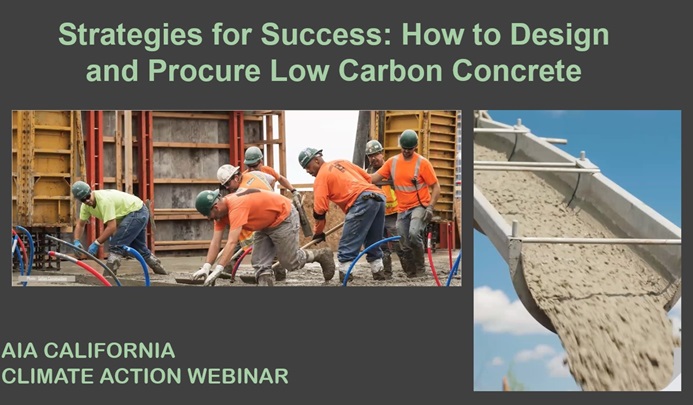
The building industry is under constant pressure to provide low-carbon solutions. Through early collaborative decision-making, performance-based specifications, and using NRMCA’s Concrete Carbon Calculator, project teams can successfully establish and execute sustainability goals.
Although this course provides valuable information about decarbonization, it is NOT part of the ZNCD program that meets the requirements for California license renewal.
Presenter:
Luke Lombardi, PE | Buro Happold; Dave Walsh, AIA, LEED AP BD+C | Dave Walsh Consulting; Brandon Wray | National Ready Mixed Concrete Association
| Provider: | AIA California - Climate Action |
|---|---|
| Certification: | AIA/CES (HSW) |
| Learning Units: | 1.25 hours |
Climate Action Part 1: Overview
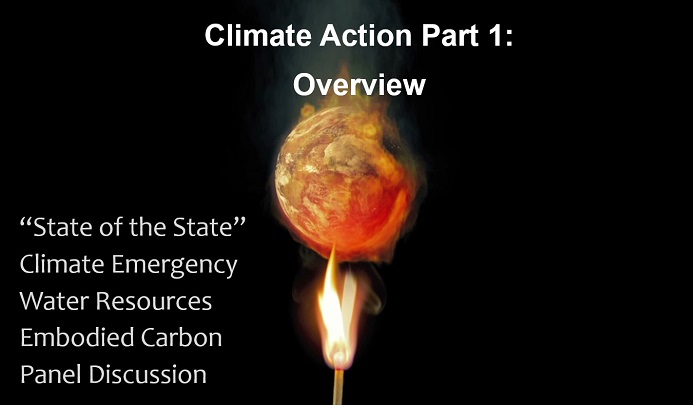
This course is offered FREE courtesy of AIA California
Part 1 of this day-long workshop, hosted by the AIA California Board of Directors, provides an overview on climate change policies and opportunities in the areas of Water, Carbon and Energy.
Presentations include a “State of the State” on California’s ambitious Zero Net Energy goals, an impassioned “Climate Emergency” warning by Ed Mazria, and presentations about preserving water resources and reducing embodied carbon. The presenters than gather for an insightful panel discussion about how the architectural profession can take action in response to the changing climate and its impact on the built environment.
Presenter:
Subject matter experts from AIA California COTE, City of Campbell, California Energy Commission, Water Foundation, Architecture 2030, and Siegel & Strain Architects
| Provider: | AIA California - Climate Action |
|---|---|
| Certification: | AIA/CES (HSW) |
| Learning Units: | 1.5 hours |
Climate Action Part 2: Implementation Strategies

This course is offered FREE courtesy of AIA California
Part 2 of this day-long workshop, hosted by the AIA California Board of Directors, provides more in-depth insights into the ZERO Code and opportunities for architects to engage in policy discussions and the code development process, strategies for reducing embedded carbon in our built environment, and examples of zero net carbon buildings.
The course concludes with an overview of opportunities and impediments that attendees identified for adopting the Zero Code and how individual architects, firms and AIA chapters can proactively respond to climate change.
Presenter:
Subject matter experts from Architecture 2030, City of Campbell, Siegel & Strain Architects, and Integral Group
| Provider: | AIA California - Climate Action |
|---|---|
| Certification: | AIA/CES (HSW) |
| Learning Units: | 1.0 hours |
